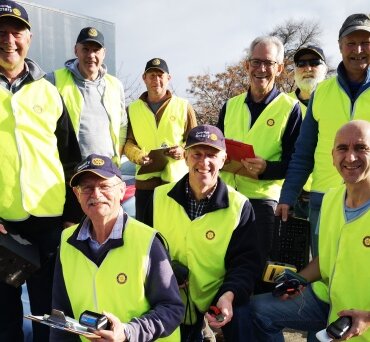
Urban Miners

Members of the Urban Mining team have diverted tonnes of waste from the district’s landfill. Back, l-r: Don Wilson, Andrew Bateman, Brian Palmer, Mark Hanlon, Don Windle, and Murray Glensor.
A group of volunteers working in Te Awamutu and Cambridge have this year diverted 8.5 tonnes of e-waste from Waipā’s landfills.
Urban Miners, a not-for-profit enterprise recycles, or diverts for reuse, domestic and business e-waste in the district.
The group of 45 volunteers runs collections from 9am to 11am once a month in both towns – the first Sunday in Te Awamutu and the third Sunday in Cambridge. It is not a free service.
Ninety per cent of the e-waste Urban Miners has collected since it started last year has been recycled. The group wants to stop 20 tonnes a year going into landfills.
Parts are taken from small household appliances, televisions, computers, tablets, laptops, printers, monitors, printers, microwaves, audio equipment, video players, DVD players, cell phones, digital cameras, power tools, batteries including car batteries and wiring.
About 80 per cent of all e-waste ends up in landfills wasting useful resources and releasing toxic chemicals, says group spokesperson Mark Hanlon.
When the e-waste ends up in landfills it is an environmental disaster for the district.
Urban Miners is supported by Cambridge Rotary, the Waipā Waste Minimisation Fund and the Cambridge Community Board.
Recently Taupō MP Louise Upston and three Waipā district councillors toured the group’s warehouse which is in a secret location to prevent unlawful dumping.

Urban Miners
There volunteers strip out what can be reused. Metals, glass and circuit boards are supplied to willing partners while any items which could be resold go to Cambridge Lions Club for its second-hand shop.
Upston told her Facebook followers she supported Urban Miners saying it provided a valuable service to the community.
Paula Reid of Cambridge took a laptop, soup maker, model and hair straightener to the e-waste collection event outside Cambridge High School on Sunday.
“When you’re given an alternative to do something with your e-waste, it’s important to do the right thing,” she said.
“What else can you do with it?”
Most people have no qualms about paying Urban Miners to take their e-waste away. One man brought printers, laptops, LCD monitors and mobile phones to the collection and willingly paid $200. A woman was not so happy about paying $10 for a radio/tape recorder to be taken away as e-waste and hurriedly drove away.
Graeme Muir brought a television and video player.
“I don’t like putting things in the dump,” he said.
Hanlon said the group did not accept whiteware – fridges, freezers, stoves, dishwashers, washing machines, dryers and smoke alarms.
The project was recently highly commended in the Waste Minimisation – Environmental Award at the 2021 Waipā Business Awards.

Urban Miners

Urban Miners

Urban Miners








